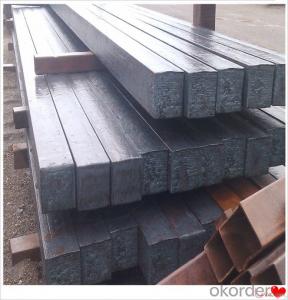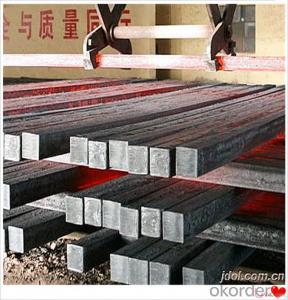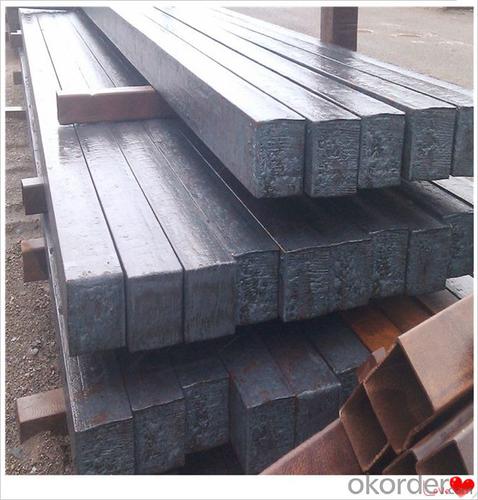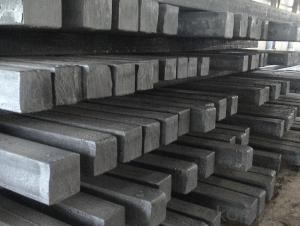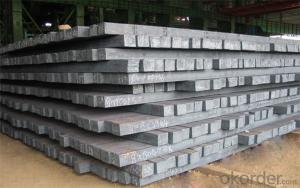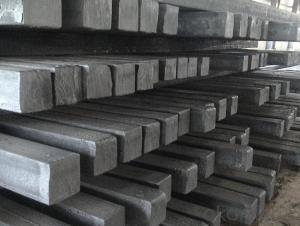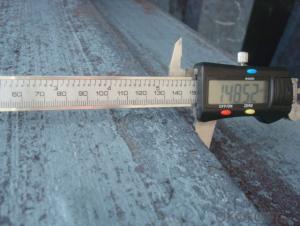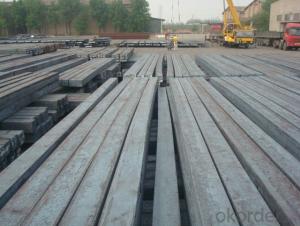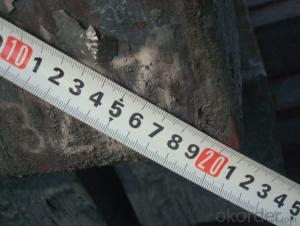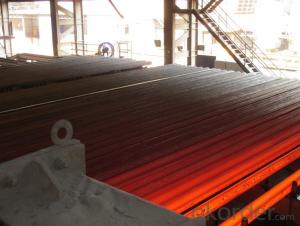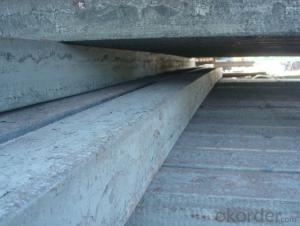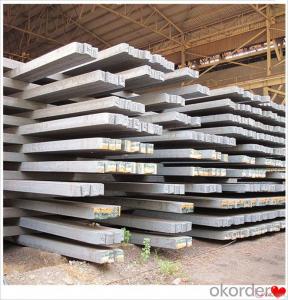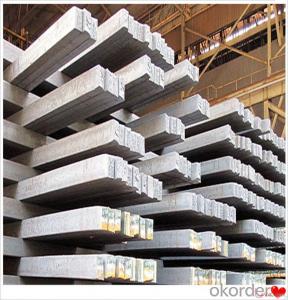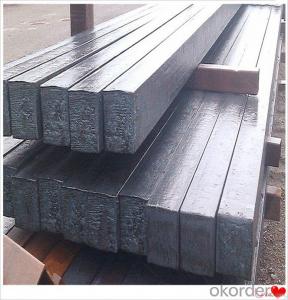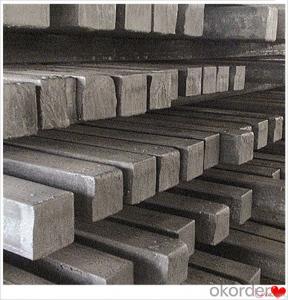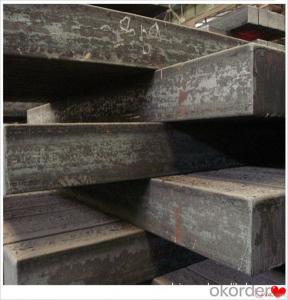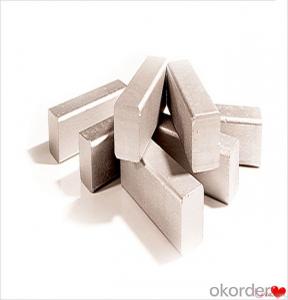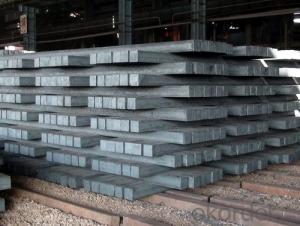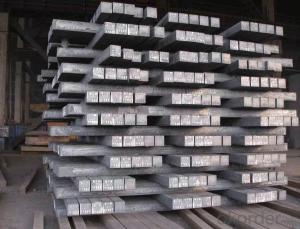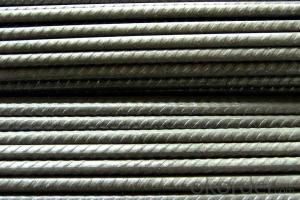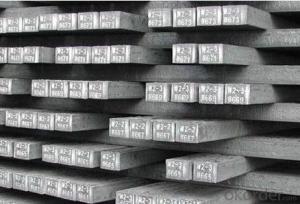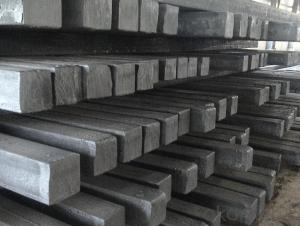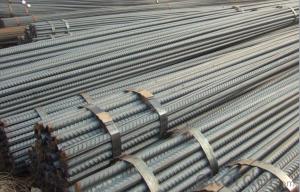5sp Mild Steel Billet Q235,Q255,Q275,Q345,3SP,5SP,20MnSi Made in China
- Loading Port:
- China main port
- Payment Terms:
- TT OR LC
- Min Order Qty:
- 20 m.t.
- Supply Capability:
- 200000 m.t./month
OKorder Service Pledge
OKorder Financial Service
You Might Also Like
5sp Mild Steel Billet Q235,Q255,Q275,Q345,3SP,5SP,20MnSi Made in China
Specification
Steel billet(ingot) by cogging or breakdown of semi-finished products, is the raw material of all kinds of steel mill. Billet section of square, round, flat, rectangular and abnormity of several kinds of, mainly related to the shape of rolled products.
CNBM Q235,Q275,Q345,3SP,5SP,20MnSi Billets Steel
Hot Rolled Steel Billets/ Mild Steel Bar/ Billet Steel
Specification (see below)
Standard: GB/JIS/ASTM
Size: 50*50mm-180*180mm
Length: 3-12mtrs or Customised
Steel material: Q235,Q255,Q275,Q345,3SP,5SP,20MnSi
Technique: Hot rolled
FOB Unit Ton Price $250-350 and Usually I will quote you CFR price.
MOQ: Usually 1000-10000MT/size
Shipment:By Container,Bulk Vessel
Packaging Details: bundles with steel strips or as customers's requirements
Delivery time: Usually within 30 days after the deposit/LC
Inspection:Third party inspection before loading.
Technical data
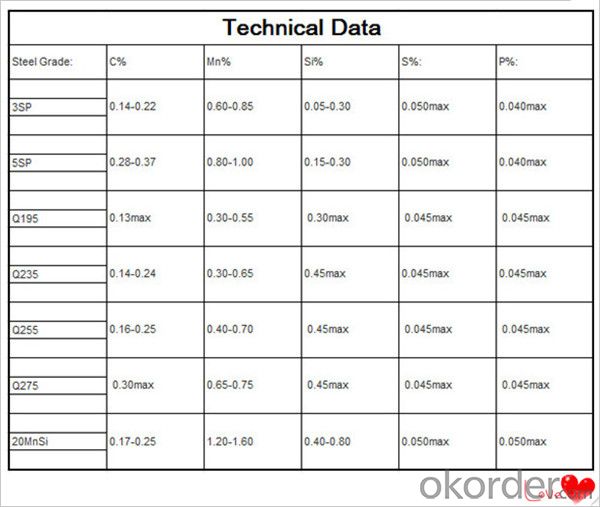
Feature Steel Billet
Rectangular billet continuous casting billet and mainly general carbon steel, low carbon low silicon cold-rolled material, high quality carbon structural steel, high strength low alloy steel, special steel, etc.
The billet is mainly divided into two kinds from the shape:
Slab: cross section width and height of the ratio of the larger, mainly used for rolling plate.
Billet: equal cross section width and height, or a huge difference, mainly used for rolling steel, wire rod. ,
Steel billets have distinct characteristics as compared with already furnished steel bars and products. Billets have a specific grain structure, which enables the metal to be processed more intricately. Steel billets are also known for their malleability and ductility, especially when exposed to varying temperatures during shaping and molding.
Packaging & Shipping
1. Packaging:
1) Small size: in bundles
2)Big size: in bulk
3)in plastic packing or as per customer requirement
2. Delivery time:
1) Normal size: within 7days send from warehouse directly
2) Special size: with 25-30days customer made for you
3. Trade terms:FOB/CFR/CIF
4. Shippment:
1) length:≤5.8m loaded in 20FT Container with 25-27tons
2) length:≤11.8m loaded in 40FT Container with 25-27tons
3) lengnth:≥12m shipped by bulk vessel, FILO terms
Steel Billet Images
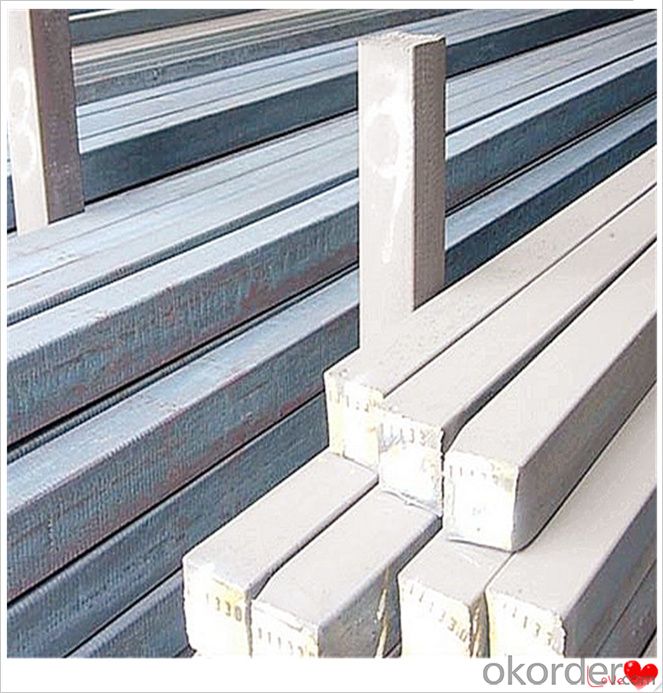
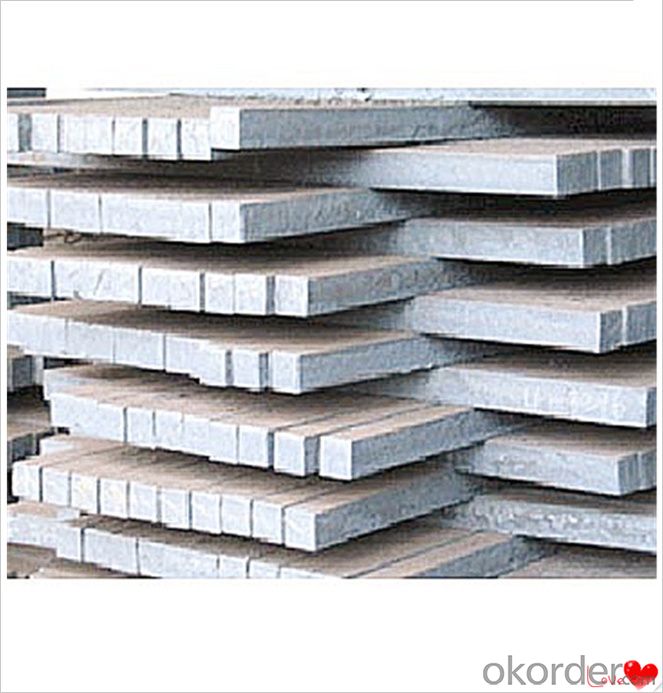
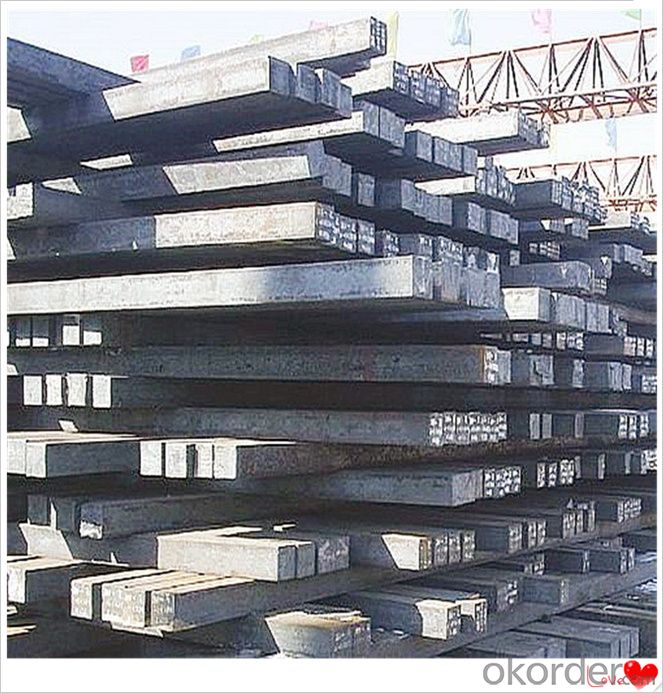
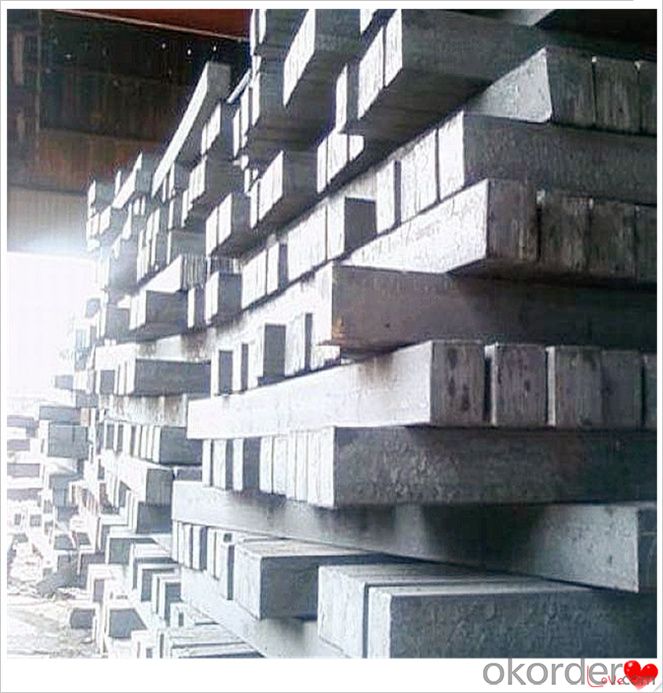
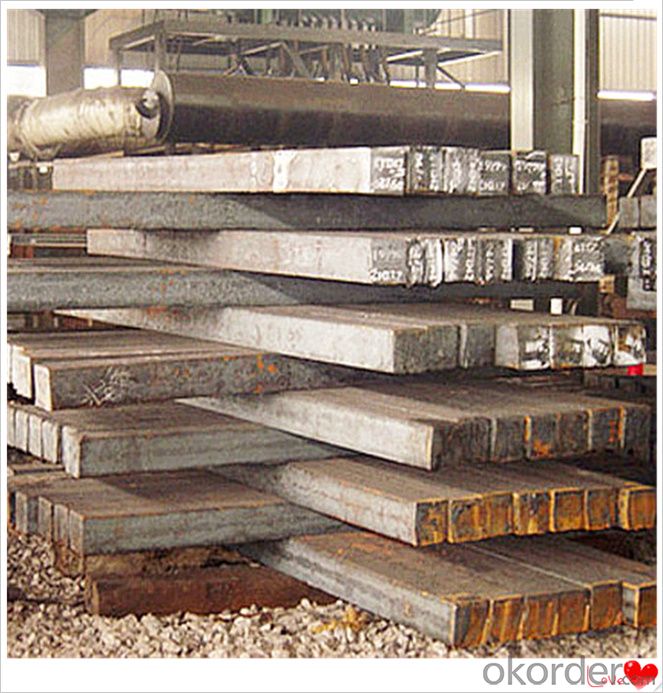
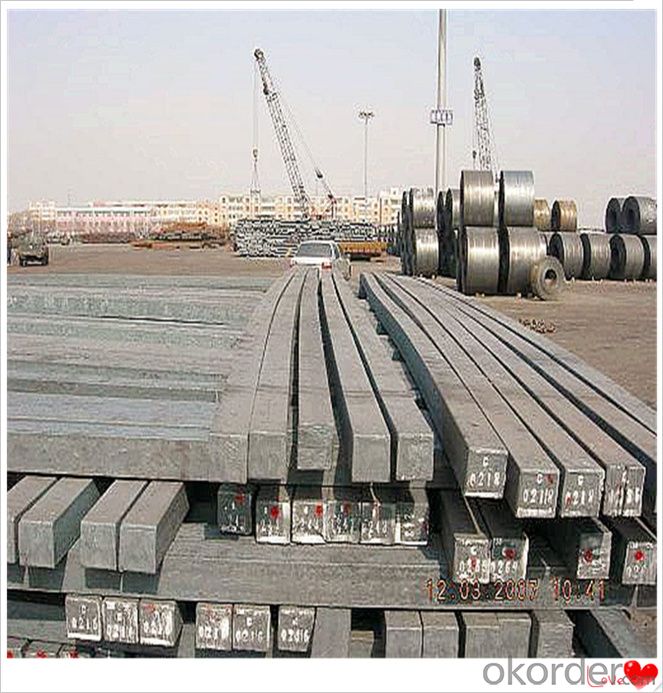
Processing
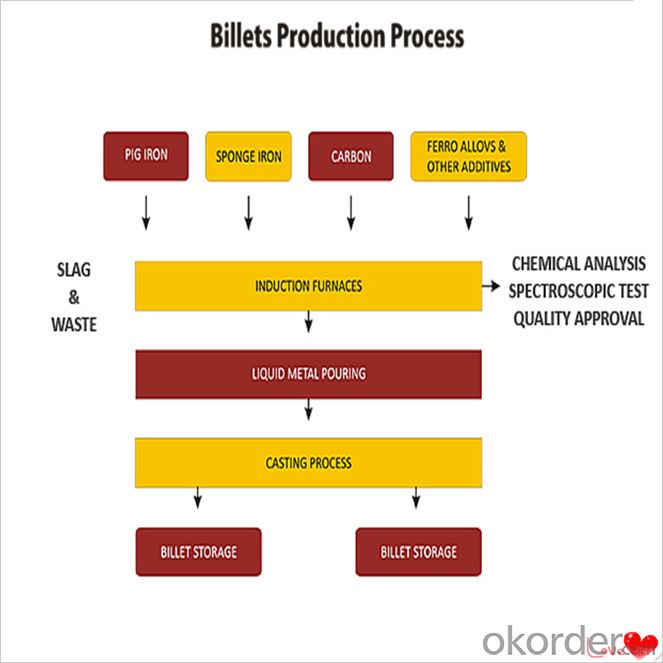
Usage-Billet Steel
Used for the plant, the bridge,shipment building high-rise building construction,lifting and transportation machinery, equipment manufracturing base building the support foundation pile manufacturing.
Billets, or ingots (as they sometimes referred to), are not of practical use until they have been formed into more functional shapes and sizes. While they have already been put in the furnace, they still require a series of shaping and molding procedures such as hot and cold working, milling and cutting before they are sold in hardware stores, or used for different applications. The unformed billets, however, can be used in striking currency such as coins and as reserves, similar to gold bars.
FAQ-Billet Steel
We have organized several common questions for our clients,may help you sincerely:
1) How about your company?
A world class manufacturer & supplier of castings forging in carbon steel and alloy steel,is one of the large-scale professional investment casting production bases in China,consisting of both casting foundry forging and machining factory. Annually more than 8000 tons Precision casting and forging parts are exported to markets in Europe,America and Japan. OEM casting and forging service available according to customer’s requirements.
2) How to guarantee the quality of the products?
We have established the international advanced quality management system,every link from raw material to final product we have strict quality test;We resolutely put an end to unqualified products flowing into the market. At the same time, we will provide necessary follow-up service assurance.
3) How long can we receive the product after purchase?
In the purchase of product within three working days, We will arrange the factory delivery as soon as possible. The pecific time of receiving is related to the state and position of customers.Commonly 7 to 10 working days can be served.
4)Do you have your own QC department?
Yes, we have, our QC department will inspect the goods during the process of mass production and after completion of production.
hot sale!!! Cast Steel Grades/ mild steel bar/ billet steel
(1): High quality steel with reasonable price.
(2): Wide excellent experiences with after-sale service.
(3): Every process will be checked by responsible QC which insures every product's quality.
(4): Professional packing teams which keep every packing safely.
(5): Trial order can be done in one week.
(6): Samples can be provided as your requirements.
- Q: How are steel billets used in the production of mining components?
- Steel billets are an integral part of the production process for mining components. These billets serve as the starting point for manufacturing various mining equipment and components. Firstly, steel billets are melted and cast into specific shapes and sizes to meet the requirements of the mining industry. The billets are heated to extremely high temperatures and then poured into molds to form the desired shape. This process is known as casting and allows for the creation of different mining components such as gears, shafts, and valves. Once the steel billets have been cast into the desired shape, they undergo further processing to enhance their strength and durability. This can involve various techniques such as forging, where the billets are subjected to high pressure and heat to improve their mechanical properties. Forged steel components are commonly used in mining applications due to their superior strength and resistance to wear and tear. Additionally, steel billets are often machined to achieve precise dimensions and finishes required for mining components. Machining involves cutting, drilling, and shaping the billets using specialized tools and machinery. This step ensures that the final mining components meet the exact specifications needed for efficient and reliable operation in mining environments. Overall, steel billets are crucial in the production of mining components as they serve as the raw material from which these components are manufactured. The versatility and durability of steel make it an ideal choice for mining applications, where equipment is subjected to demanding conditions. By starting with steel billets and utilizing various manufacturing processes, mining companies can produce high-quality components that are essential for the efficient and safe operation of mining operations.
- Q: What are the main alloying elements used in steel billet production?
- The main alloying elements used in steel billet production are carbon, manganese, silicon, and chromium.
- Q: How do steel billets contribute to the overall recyclability of a product?
- Steel billets contribute to the overall recyclability of a product by being a primary raw material in steel production. When a product made of steel reaches the end of its life cycle, it can be recycled and transformed into new steel products using steel billets. This reduces the need for extracting and refining new raw materials, conserves energy, and minimizes waste, making the overall recycling process more efficient and sustainable.
- Q: What are the potential applications of steel billets in the aerospace industry?
- Steel billets have several potential applications in the aerospace industry. They can be used for the manufacturing of various components such as engine parts, landing gear components, and structural elements. The high strength and durability of steel billets make them suitable for ensuring the structural integrity and safety of aircraft. Additionally, their excellent heat resistance properties make them ideal for applications in the aerospace industry where high temperatures are encountered, such as in jet engines.
- Q: What is the role of steel billets in the manufacturing of structural steel buildings?
- The manufacturing of structural steel buildings heavily relies on steel billets, which are semi-finished forms of steel. These billets act as the primary raw material for creating different steel products utilized in construction. To begin with, steel billets are instrumental in the production of long steel products like beams, columns, and rods. These components play a crucial role in forming the skeletal structure of buildings, offering support and stability. Manufacturers can shape and process the steel billets through techniques like rolling, forging, or extrusion to fabricate these vital structural elements. Due to the exceptional strength and durability of steel, it is an ideal material for constructing buildings capable of withstanding heavy loads and adverse environmental conditions. Moreover, steel billets are also employed in the manufacturing of other significant components such as plates and sheets. These flat steel products are utilized for flooring, roofing, and cladding in structural steel buildings. Apart from providing a protective and aesthetically pleasing finish to the building, these flat steel products contribute to its overall strength and stability. The consistent quality and uniformity of steel billets ensure that the resulting structural steel components possess the necessary mechanical properties, including tensile strength and ductility, to meet the safety and performance standards required by construction projects. Steel billets are frequently produced using advanced manufacturing techniques like continuous casting, which further enhances the quality and reliability of the final steel products. In conclusion, steel billets are indispensable in the manufacturing of structural steel buildings as they serve as the raw material for producing various components such as beams, columns, plates, and sheets. These components form the framework and protective elements of the building, providing strength, stability, and durability. Through meticulous processing and quality control, steel billets enable the production of high-quality steel products that satisfy the stringent requirements of the construction industry.
- Q: What are the different testing methods used for steel billets?
- Some of the different testing methods used for steel billets include visual inspection, ultrasonic testing, magnetic particle testing, eddy current testing, and hardness testing.
- Q: What are the factors affecting the price of steel billets?
- The price of steel billets can be affected by various factors. Firstly, the balance between supply and demand plays a significant role. If the demand for steel billets is high and the supply is limited, the price will rise. On the other hand, if the supply exceeds the demand, the price will decrease. Additionally, the cost of raw materials used in the production of steel billets, such as iron ore and coal, can greatly impact the price. Fluctuations in the prices of these raw materials can lead to changes in production costs, which in turn affect the price of steel billets. Furthermore, energy prices have a direct impact on the price of steel billets as their production requires a significant amount of energy. If energy prices increase, the cost of production for steel billets will also rise, resulting in a higher price. Transportation costs also play a role in determining the final price of steel billets. Factors like fuel prices, distance, and transportation infrastructure can impact the costs involved in transporting steel billets from the manufacturing plant to the market, thereby influencing the price. Government regulations and trade policies, such as import/export duties, tariffs, and quotas, can significantly affect the price of steel billets. These policies can restrict or facilitate the movement of steel billets between countries, impacting the supply and demand dynamics and, subsequently, the price. Moreover, fluctuations in currency exchange rates can influence the price of steel billets, as they are traded globally. If the currency in which steel billets are traded weakens against other currencies, the price may increase to compensate for the decreased value of the currency. Lastly, market speculation and investor sentiment can also influence the price of steel billets. Economic indicators, geopolitical events, and investor expectations can drive buying or selling behavior, leading to price fluctuations. It is important to recognize that these factors are interconnected and can interact with each other, resulting in a complex and dynamic market for steel billets.
- Q: How are steel billets used in the manufacturing of power transmission equipment?
- Steel billets are used in the manufacturing of power transmission equipment as they serve as the raw material for various components such as gears, shafts, and housings. These billets are forged, machined, and shaped into the required sizes and shapes to create strong and durable parts that can withstand the high loads and pressures involved in power transmission. Overall, steel billets play a vital role in ensuring the reliability and performance of power transmission equipment.
- Q: How are steel billets used in the energy and power generation industry?
- Steel billets are used in the energy and power generation industry for various purposes such as manufacturing turbine blades, generator parts, and structural components of power plants. These billets are essential in creating strong and durable equipment that can withstand the demanding conditions and high temperatures associated with energy production.
- Q: What is the role of steel billets in the manufacturing of storage systems?
- The manufacturing of storage systems heavily relies on steel billets due to their unique properties and versatility. These billets, which are semi-finished steel products, are essential raw materials used in various manufacturing processes. An important function of steel billets in the manufacturing of storage systems is to act as the base material for producing different components like shelves, frames, supports, and racks. The strength and durability of steel make it an excellent choice for these applications as it can endure heavy loads and offer long-lasting performance. Typically, steel billets are melted and cast into specific shapes, such as square or round, to meet the requirements of the storage system design. These billets then undergo additional processing, like hot rolling, to transform them into the desired dimensions and form. This process helps refine the steel's microstructure, enhancing its mechanical properties and ensuring consistent quality. The versatility of steel billets allows manufacturers to customize storage systems according to specific needs. By shaping and welding steel billets, manufacturers can create storage systems with various configurations, sizes, and load capacities. This flexibility enables the production of storage systems tailored for different industrial and commercial applications, ranging from warehouses to retail stores. Furthermore, steel billets exhibit excellent resistance to corrosion, making them suitable for storage systems used in both indoor and outdoor environments. This resistance ensures that the storage systems maintain their structural integrity and appearance over time, even in harsh conditions. In conclusion, steel billets play a crucial role in the manufacturing of storage systems as they serve as the raw material for various components. Their strength, durability, versatility, and corrosion resistance make them an ideal choice for fabricating storage systems capable of withstanding heavy loads, providing long-lasting performance, and meeting specific design requirements.
Send your message to us
5sp Mild Steel Billet Q235,Q255,Q275,Q345,3SP,5SP,20MnSi Made in China
- Loading Port:
- China main port
- Payment Terms:
- TT OR LC
- Min Order Qty:
- 20 m.t.
- Supply Capability:
- 200000 m.t./month
OKorder Service Pledge
OKorder Financial Service
Similar products
Hot products
Hot Searches
Related keywords
